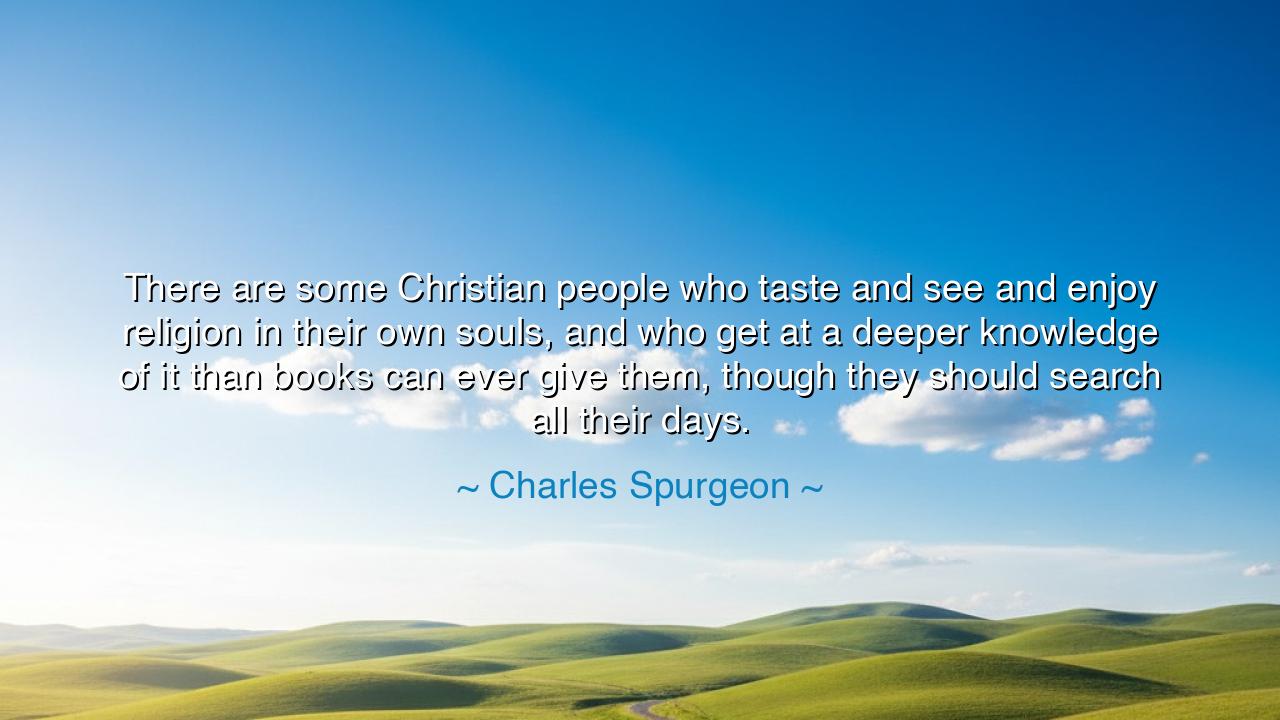
There are some Christian people who taste and see and enjoy
There are some Christian people who taste and see and enjoy religion in their own souls, and who get at a deeper knowledge of it than books can ever give them, though they should search all their days.






“There are some Christian people who taste and see and enjoy religion in their own souls, and who get at a deeper knowledge of it than books can ever give them, though they should search all their days.” — Charles Spurgeon
In these sacred words, Charles Spurgeon, the “Prince of Preachers,” unveils one of the greatest mysteries of the spiritual life — that true knowledge of God is not merely learned, but lived; not studied with the mind alone, but experienced in the soul. He speaks of those rare souls who have gone beyond the outer walls of doctrine and entered the inner sanctuary of divine communion. These are the ones who have tasted and seen that the Lord is good, as the Psalmist once wrote. Spurgeon reminds us that religion, when confined to the intellect, is but a shadow; but when it reaches the heart, it becomes living fire — something that transforms, illuminates, and sustains.
The origin of this quote rests in Spurgeon’s lifelong ministry, which sought to awaken hearts rather than fill heads. In an age of sermons, debates, and theological rivalry, Spurgeon saw how easily people mistook knowledge about God for knowing God. His words are a protest against shallow faith — a call to return to the inward experience of grace, the kind that floods the heart with peace and power no book could ever teach. He understood that religion is not a theory, but a relationship; not a lesson, but a life. Thus, he praised those believers who “taste and see,” whose faith is not borrowed from others, but born from within, glowing like a lamp lit by the hand of God Himself.
The ancients, too, understood this divine paradox — that wisdom begins where words end. The desert fathers of early Christianity fled into solitude not to escape learning, but to encounter truth directly. In silence and prayer, they sought the voice of God in the stillness of their souls. Like Spurgeon’s “Christian people,” they discovered that one moment of genuine communion with the Divine can reveal more than a lifetime of study. For books can point to the path, but they cannot make the journey for us; sermons can describe the light, but only the heart can see it. True religion, Spurgeon declares, is experiential — it is when the eternal touches the mortal, when faith ceases to be an idea and becomes a heartbeat.
Consider the life of John Bunyan, the tinker of Bedford, who wrote The Pilgrim’s Progress not from a scholar’s desk, but from a prison cell. He was a man of little formal education, yet his words have outlived the libraries of his age. Why? Because his wisdom was forged not in argument, but in suffering and revelation. He “tasted and saw” God’s presence in his affliction. He did not read of redemption — he felt it in the marrow of his soul. His work endures because it springs from that same deep well of living experience that Spurgeon honors — the well where faith becomes real, and learning turns to light.
Spurgeon’s quote also stands as a quiet rebuke to those who would make religion an exercise of pride. He reminds us that the soul’s knowledge of God cannot be earned, only received. The greatest theologian may miss the truth that the humblest believer can touch in prayer. The widow with her two coins, the child who whispers a bedtime prayer, the sinner who weeps in repentance — these may know more of heaven than the scholar who studies it by candlelight. For the things of God, as Scripture says, are “spiritually discerned.” The intellect is a fine servant, but it cannot enter the holy of holies. Only love, humility, and surrender can pass through that veil.
In this, Spurgeon is not condemning learning — far from it. He was himself a man of great study, a master of the Word. But he knew that books can only teach the language of faith; the soul must learn its music. To “taste and see” is to enter the mystery personally — to feel the weight of grace, to know the sweetness of forgiveness, to sense the nearness of the Infinite. The difference between knowing and experiencing is the difference between reading about fire and standing within its warmth. The one informs, but the other transforms.
Let this be the lesson for all who seek truth: that the goal of faith is not to accumulate knowledge, but to encounter God. Read, yes — but also pray. Study the Word — but also live it. Seek to know not only the doctrines of heaven, but the presence of heaven itself. For as Spurgeon teaches, real religion begins when the written word becomes a living Word within you. When truth ceases to be ink on a page and becomes life in your soul, then — and only then — have you found the knowledge that books cannot give.
So, O seeker of wisdom, remember this ancient counsel: taste and see. Do not be content to hear of God’s goodness — experience it. Let your soul drink deeply of the joy, peace, and power that flow from communion with the Divine. For in that sacred tasting, in that inward seeing, you will discover what Spurgeon and the saints before him knew: that the greatest revelation is not written in ink, but upon the heart — and that the truest knowledge is not of the mind, but of the soul awakened by love.






AAdministratorAdministrator
Welcome, honored guests. Please leave a comment, we will respond soon